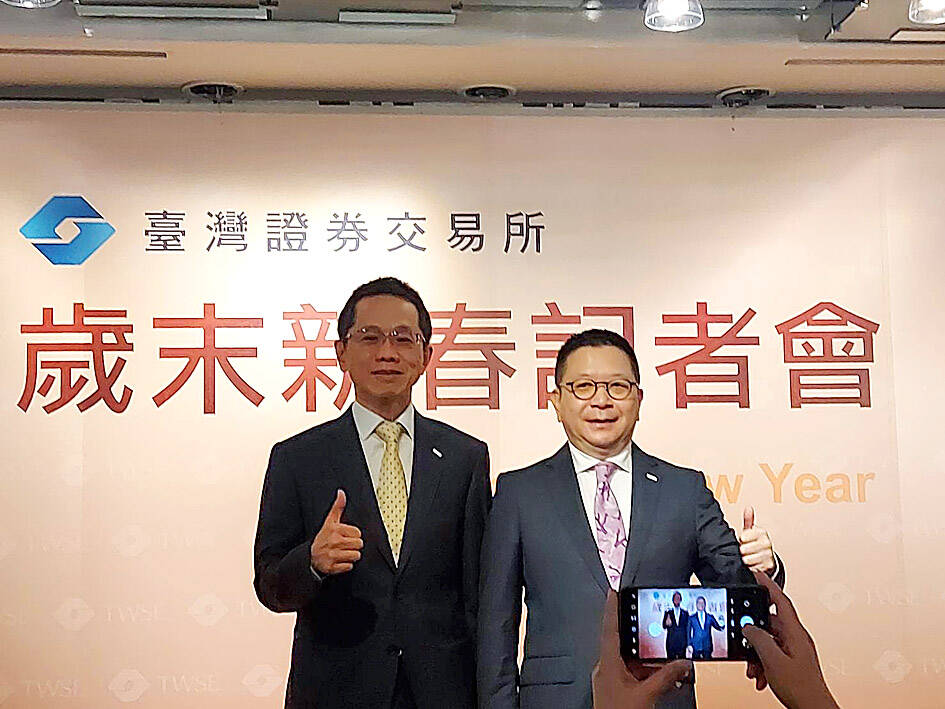The Taiwan Stock Exchange (TWSE) is looking to strengthen its market capitalization and liquidity this year by boosting the TAIEX’s presence at home and abroad, among other measures, TWSE chairman Sherman Lin (林修銘) said at a media briefing in Taipei yesterday.
Lin said he is seeking another 5 percent gain in market capitalization to NT$60 trillion (US$1.93 trillion), from NT$56.84 trillion last month, making the local bourse more attractive and liquid.
“The TWSE is to prioritize boosting the local bourse’s capitalization and liquidity as they sit atop the list of concerns of investors,” alongside companies’ earnings ability, business outlook and dividend policy, he said.

Photo: Chen Yung-chi, Taipei Times
The exchange would work with JPMorgan Asset Management Ltd, HSBC Holdings PLC, Goldman Sachs Group Inc and several other foreign securities houses and custodian banks to jointly woo foreign investment funds and amplify the exposure of local firms, Lin said.
Officials from the exchange and the Financial Supervisory Commission last year visited Singapore, Japan and the US to help the local bourse better connect with other international capital markets, he said.
Exchange officials would visit investment institutions in the UK, EU and Middle East later this year to promote Taiwanese equities and add momentum to the local bourse, he said, adding that they are targeting listed firms with a capitalization of more than NT$10 billion.
The TAIEX last year moved from a trough of 14,000 points to finish at 17,930.81, logging a 26.8 increase that was second only to Japan’s Nikkei 225 Index and stronger than the Dow Jones Industrial Average, S&P 500 and indices in Europe, Lin said.
That was despite aggressive monetary tightening by major central banks to tame inflation and intensifying geopolitical tensions, he said.
Daily turnover averaged NT$281.2 billion last year and there is still room for improvement this year, Lin said.
The local bourse last year had 12.51 million participants, accounting for 53 percent of the nation’s population, with those aged 20 to 30 making up half of the total, TWSE data showed.
Foreign funds own 40.60 percent of local shares after increasing their holdings by a net NT$275.4 billion last year.
The pace sharpened to NT$420 billion in November and last month, suggesting capital outflows in previous months.
Last year, 42 firms filed initial public offering applications, with 28 being approved and raising a total of NT$33.76 billion, the exchange said.
The exchange’s new trading platform for start-ups, the Taiwan Innovation Board, last year processed 14 listing applications with 10 making it onto the board, it said.
While only qualified investors are allowed to buy shares listed on the new trading platform, given the higher risks involved in investing in start-ups, the number of qualified investors more than doubled to 272,000 last year, it added.

BYPASSING CHINA TARIFFS: In the first five months of this year, Foxconn sent US$4.4bn of iPhones to the US from India, compared with US$3.7bn in the whole of last year Nearly all the iPhones exported by Foxconn Technology Group (富士康科技集團) from India went to the US between March and last month, customs data showed, far above last year’s average of 50 percent and a clear sign of Apple Inc’s efforts to bypass high US tariffs imposed on China. The numbers, being reported by Reuters for the first time, show that Apple has realigned its India exports to almost exclusively serve the US market, when previously the devices were more widely distributed to nations including the Netherlands and the Czech Republic. During March to last month, Foxconn, known as Hon Hai Precision Industry

Taiwan Semiconductor Manufacturing Co (TSMC, 台積電) and the University of Tokyo (UTokyo) yesterday announced the launch of the TSMC-UTokyo Lab to promote advanced semiconductor research, education and talent development. The lab is TSMC’s first laboratory collaboration with a university outside Taiwan, the company said in a statement. The lab would leverage “the extensive knowledge, experience, and creativity” of both institutions, the company said. It is located in the Asano Section of UTokyo’s Hongo, Tokyo, campus and would be managed by UTokyo faculty, guided by directors from UTokyo and TSMC, the company said. TSMC began working with UTokyo in 2019, resulting in 21 research projects,

Ashton Hall’s morning routine involves dunking his head in iced Saratoga Spring Water. For the company that sells the bottled water — Hall’s brand of choice for drinking, brushing his teeth and submerging himself — that is fantastic news. “We’re so thankful to this incredible fitness influencer called Ashton Hall,” Saratoga owner Primo Brands Corp’s CEO Robbert Rietbroek said on an earnings call after Hall’s morning routine video went viral. “He really helped put our brand on the map.” Primo Brands, which was not affiliated with Hall when he made his video, is among the increasing number of companies benefiting from influencer

Quanta Computer Inc (廣達) chairman Barry Lam (林百里) yesterday expressed a downbeat view about the prospects of humanoid robots, given high manufacturing costs and a lack of target customers. Despite rising demand and high expectations for humanoid robots, high research-and-development costs and uncertain profitability remain major concerns, Lam told reporters following the company’s annual shareholders’ meeting in Taoyuan. “Since it seems a bit unworthy to use such high-cost robots to do household chores, I believe robots designed for specific purposes would be more valuable and present a better business opportunity,” Lam said Instead of investing in humanoid robots, Quanta has opted to invest